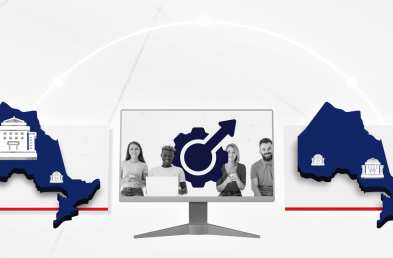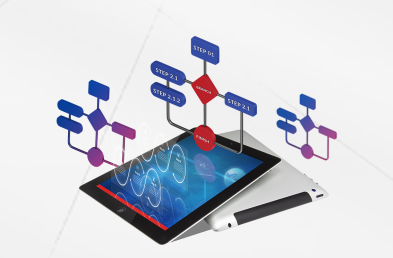As we enter 2024, the world of corporate education is set to continue down the path of transformative evolution. With its steady growth, eLearning will experience a significant surge in innovation and adaptability, and 2024 will be pivotal as new technologies are refined over time and integrated into new systems.
The Evolution of E-Learning
eLearning has been steadily gaining traction over the years, allowing learners to acquire knowledge on their own terms. The COVID-19 pandemic accelerated this trend, highlighting the importance of online education. Next year, this evolution will continue, but with a stronger emphasis on adaptability and personalization.
Artificial Intelligence (AI): At the Heart of eLearning
Artificial intelligence will be the driving force behind the transformation of eLearning in 2024. AI can facilitate personalized learning experiences, making education more engaging and efficient.
- Personalized Learning Paths: AI algorithms will analyze a student’s learning style, pace, and preferences to create personalized learning paths. This customization ensures that students receive content and assessments best suited to their needs, maximizing their understanding and retention.
- Real-time Feedback: AI can provide immediate feedback on assessments and assignments, helping learners identify their strengths and areas that need improvement. This timely feedback will motivate students and empower them to take control of their learning journey.
- Intelligent Content Development: AI-powered content recommendation systems will curate learning materials from various sources to create comprehensive and engaging courses. This not only saves time for educators but also keeps students engaged with fresh and relevant content.
- Predictive Analytics: AI can predict student performance and identify potential issues, allowing educators to intervene proactively. By addressing difficulties early, students are more likely to succeed and stay engaged in their courses.
Adaptive Technology: Tailoring Learning Experiences
eLearning platforms will embrace adaptive technology to cater to individual learners’ needs. Adaptive technology uses AI and data analysis to create a personalized and responsive learning environment.
- Customized Content Delivery: Adaptive technology adjusts the difficulty and format of content based on a student’s performance and preferences. This ensures that learners are neither overwhelmed by challenging material nor bored by content that is too easy.
- Targeted Resources: Adaptive technology identifies areas where a student needs extra support and provides resources like videos, quizzes, or additional readings to reinforce their understanding.
- Progress Tracking: Learners and educators can easily monitor progress through adaptive technology, allowing for continuous improvement and targeted interventions.
Engaging Learning Experiences
Online learning will move away from traditional approaches and embrace innovative techniques to keep learners engaged and motivated. Here are some methods that will create exciting learning experiences:
- Gamification: Gamifying eLearning experiences can make courses more engaging. Elements such as leaderboards, badges, and interactive challenges will create a sense of competition and achievement, motivating students to participate in their education actively.
- Virtual Reality (VR) and Augmented Reality (AR): VR and AR technologies will be integrated into online curriculums, providing immersive experiences that transport learners to virtual environments or enhance their understanding of complex subjects.
- Social Learning: eLearning platforms will encourage collaboration through forums, discussion boards, and virtual study groups. These interactions will replicate the social aspect of traditional classrooms, fostering a sense of community among online learners.
- Interactive Assessments: Traditional multiple-choice tests will be replaced by interactive assessments that require problem-solving and critical thinking. These assessments will challenge students to apply their knowledge in practical scenarios.
2024 is a year where we will see a consistent and rapid evolution of technologies into a more personalized, engaging, and efficient educational ecosystem. Integrating AI and adaptive technology will be at the heart of this transformation, enabling learners to have tailor-made educational experiences that suit their unique needs and preferences.
The role of educators will shift from information providers to learning facilitators and mentors. They will leverage new technologies to create customized learning paths, offer timely feedback, and ensure no student is left behind. The result will be an educational landscape where every learner, regardless of their background or learning style, can thrive.
Incorporating engaging elements such as gamification, VR, AR, and collaborative learning will make education a truly immersive and exciting experience. This evolution will not only enhance the quality of education but also increase accessibility, making learning more inclusive and global.
In conclusion, 2024 is set to be a year of incredible advancement for e-learning, driven by the integration of new technologies and a renewed focus on personalization and engagement. As e-learning evolves, it will empower learners and educators alike, ushering in a new era of knowledge acquisition and skill development. The future of education is here, and it’s bright, dynamic, and full of opportunities for all.




